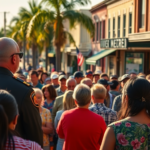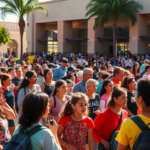McAllen Responds to DHS Migrant Grant Demands; Brownsville Stays Mum
In an ongoing and complex issue surrounding migrant assistance along the U.S.-Mexico border, McAllen has taken a proactive stance while neighboring Brownsville remains silent. The Department of Homeland Security (DHS) recently announced updated demands for cities receiving federal grants aimed at supporting migrant communities. This directive has sparked varied responses in the Rio Grande Valley (RGV), reflecting its significant local impact and community interest.
Summary of the DHS Directive
The DHS’s recent adjustments to migrant grant requirements are designed to optimize the allocation of resources and ensure that funds are directed towards cities that actively address migrant needs effectively. This includes providing adequate shelter, health services, and legal aid for migrants transitioning through the South Texas region.
McAllen’s City Manager, Michael Villarreal, expressed his city’s commitment to meeting the new criteria set forth by the DHS. “We recognize the critical situation at our border and the importance of using these resources wisely to benefit both migrants and Valley residents. Our aim is to rise to this challenge through comprehensive planning and community partnerships,” he stated.
McAllen’s Proactive Approach
McAllen has long been at the forefront of managing migrant influxes, given its strategic location along the border. The city has invested in establishing efficient support systems, including temporary shelters, health clinics, and partnerships with non-profit organizations dedicated to immigrant aid. This proactive approach not only aligns with federal expectations but also showcases McAllen’s dedication to humanitarian efforts.
Local businesses in McAllen have also echoed support for the city’s initiative. Marisa Gonzalez, owner of a downtown eatery, noted, “When the city supports migrants effectively, it shows compassion and fosters a positive environment for everyone. Migrants also contribute to our economy in various ways, so it’s in our interest to aid their smooth integration.”
Brownsville: A Cautious Silence
Contrastingly, Brownsville has maintained a cautious silence on the matter, neither openly supporting nor opposing the new DHS grant demands. This reticence has raised questions about the city’s strategic plans and its standpoint on federal involvement in local immigrant assistance programs.
Some community members speculate that Brownsville’s silence stems from logistical challenges or political considerations. “Our community is diverse and resilient, yet there are layers of complexity in managing migrant affairs. The city may be carefully assessing how to proceed without disrupting local dynamics,” stated Juan Castillo, a sociologist specializing in border studies.
Local Impact and Community Concerns
For the RGV community, the disparity in responses between McAllen and Brownsville highlights broader concerns about the region’s capacity to handle migrant needs while ensuring local residents’ well-being. There are worries that inaction or ineffective responses could strain resources, affecting public services such as healthcare and education.
“We are all stakeholders in how these issues are managed. While McAllen’s proactive stance is reassuring, we hope Brownsville clarifies its position soon to prevent potential disruptions or misunderstandings,” emphasized Maria DeLeon, a community activist in the Valley.
Historical Context and Future Implications
Historically, the RGV has been at the center of migrant crossings and federal interventions. Past experiences with border policies and fluctuating migration levels inform current strategies and reactions. As McAllen progresses with compliance and Brownsville remains reserved, the contrasting approaches reflect a longstanding regional dialogue on migration and federal collaboration.
Looking forward, the implications of these differing strategies could influence regional dynamics profoundly. Successful adaptation to DHS’s demands could position McAllen as a model for other border communities. Conversely, Brownsville’s approach could signal either an innovative solution or a challenge in federal-city relations.
Balancing Perspectives and Building Solutions
Balanced reporting requires acknowledging both the potential benefits and challenges of complying with DHS grant demands. Supporters argue that adhering to these requirements ensures accountability and efficient resource use. Critics, however, fear that strict adherence may overlook local needs or impose undue burdens on already stretched city resources.
Regardless, collaborative dialogue remains essential. Community forums and open communication channels can facilitate understanding between federal authorities, city officials, and Valley residents, enabling solutions that respect diverse viewpoints.
Community Resources and Engagement
To support residents and stakeholders, the City of McAllen is hosting workshops about the updated DHS requirements and their anticipated impact. These sessions are designed to inform and engage, ensuring that everyone has a voice in shaping McAllen’s future actions concerning migrant assistance.
In conclusion, as the situation develops, Valley residents must stay informed and involved. Whether McAllen’s proactive efforts will serve as a successful precedent or if Brownsville will chart a new course remains to be seen. What is clear is the unwavering commitment of the Rio Grande Valley to navigate these complex issues while fostering community resilience and compassion.







